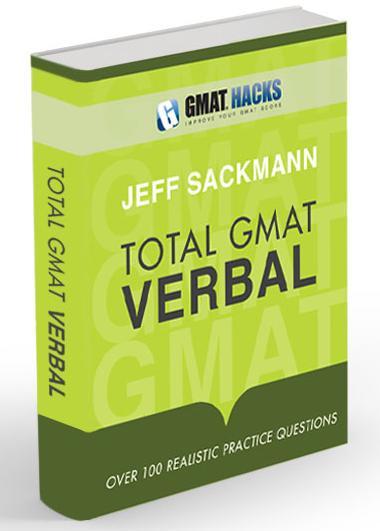
Bookshelf
|
|
Total GMAT Math Jeff's complete Quant guide, on sale now! |
|
|
Total GMAT Verbal Everything you need to ace GMAT Verbal! |
1,800 Practice Math Questions
Buy Jeff's books at Amazon.com

GMAT Official Guide, with IR
OG Math | OG Verbal
OG12 & Quant Rev solutions!
GMAT Question of the Day
Beginner's Guide to the GMAT
GMAT Hacks Affiliate Program

Recent Hacks

Categories
- General Study Tips
- Goals and Planning
- CAT Strategy
- The Mental Game
- GMAT Math Strategy
- GMAT Math Topics
- Mental Math
- Data Sufficiency
- Critical Reasoning
- Reading Comprehension
- Sentence Correction
- Analytical Writing Assessment
- Integrated Reasoning
- IR Explained
- Business School Admissions
- GMAT Prep Resources
- Practice Questions
- Total GMAT Math
- Total GMAT Verbal
- GMAT 111

True, but not Correct
| You should follow me on Twitter. While you're at it, take a moment to subscribe to GMAT Hacks via RSS or Email. |
Lots of wrong answer choices in GMAT Critical Reasoning are tempting, for various reasons. One way in which these answers tempt you is by being true--or, at least, plausibly so--even though they don't answer the question.
Here are few examples of such answer choices from CR questions I've written lately. All of them could well be true:
- Major electronics manufacturers do not limit their production plants to one country, often dividing different stages of manufacturing among plants around the world.
- Many college students do not purchase alcohol at bars or liquor stores.
- The prices of staple goods, including foodstuffs such as rice, do not fluctuate as much as those of non-necessary goods, such as consumer electronics.
- Many popular investments are created by pooling state and municipal bonds to create tax-exempt index funds.
All of these choices are probably true. All of them have quite a bit to do with the topic of the associated CR question. And all of them are wrong.
The Scope of Critical Reasoning
This is no accident. "True" answers aren't always wrong answers, but they usually are. There are two reasons for this:
- If something sounds true, it sounds correct. It's a good way for the testmaker to see if you're really paying attention to the question, or if you're just looking for an answer that sounds right.
- Most CR questions have very specific topics. Something that is generally true (like the examples given above) probably doesn't not directly relate to the topic of the question.
The second reason is the most important. If you work hard enough, you can probably dream up a CR passage that would many any of the examples above correct. But more commonly, a question touches on a very specific topic, and the answer must as well. Here's the passage and question associated with the fourth example choice I offered above:
City Council: Cities may issue municipal bonds to fund public projects. Because the interest paid to the bond holder is tax-exempt, municipal bonds are an attractive investment. So, to pay for the five state-of-the-art school buildings needed to accommodate our growing student population, Northopolis should issue a ten-year, $200 Million bond, thereby paying for the buildings with revenues from an expanding tax base.Which of the following, if true, casts the most serious doubt on the likelihood that the bond issue recommended above will have the result that is claimed?
Not only should the correct answer have something to do with municipal bonds, but is should also include something about why these bonds might not have the desired impact.
How to Put Your CR Focus Elsewhere
As you carefully read the passage, focus on the exact scope of the passage. In this case, it's the claim that a bond issue will make it possible for the city to pay for school buildings with increased tax receipts. That's a very limited subject, and the correct choice will have to address it directly.
Once you're focused so closely on the subject of the passage, it should be easy to brush off those choices that are generally true, but not relevant to the question.
About the author: Jeff Sackmann has written many GMAT preparation books, including the popular Total GMAT Math, Total GMAT Verbal, and GMAT 111. He has also created explanations for problems in The Official Guide, as well as 1,800 practice GMAT math questions.
 |
Total GMAT Verbal
The comprehensive guide to the GMAT Verbal section. Recognize, dissect, and master every question type
you'll face on the test. Everything you need, all in one place, including 100+ realistic practice questions. |